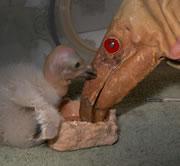 "Are you my mummy?"Ken Bohn, Zoological Society of San Diego.
"Are you my mummy?"Ken Bohn, Zoological Society of San Diego.California condors reared by puppets have social difficulties in adulthood, researchers have found.
Captive-born birds raised by puppets and released into the wild show an unhealthy curiosity about humans, and are less social with other condors, say biologist Amy Utt of Loma Linda University, California, and her colleagues.
"One of the puppet-reared birds that I studied was fascinated with rock climbers. He would perch on the rocks above them and just watch with interest as people went by," says Utt. Others explored rubbish dumps or approached humans with excessive boldness.
Hunting and habitat loss almost wiped out the California condor; in 1982, there were an estimated 24 birds left in the wild. To save the species, researchers developed complex breeding and chick-rearing techniques.
One such technique was 'double clutching', in which the first egg laid by a pair is confiscated, inducing the birds to lay a second. The second was usually raised by the parents, whereas the first was usually raised by a puppet or occasionally foster parents.
Puppets look like the heads of adult condors, and are used to feed the hatchlings until they fledge. They also give the youngsters an adult image to focus on, so they can identify with their species.
This allowed a lot of chicks, which might otherwise have been killed by inexperienced parents — or never been born at all — to make it to adulthood. But the long-term effects of such methods were largely unknown. Utt's team reports its findings in Zoo Biology1.
Taken under the wing
Initially puppeteers were very gentle with the hatchlings. But these birds did not integrate well into the condor community, prefering to play with garbage and chew on the roof tiles of nearby houses.
Videos of condor parents showed the puppeteers they were being too gentle. They became stricter parents, forcing the youngsters to behave more submissively.
The researchers are also addressing the condors' social problems with a mentoring programme. Condors raised by parents and by puppets are placed in an aviary before being released, where they can learn social skills from adults.
"It's kind of like pre-school for condors," says Utt.
Chicks being fed by puppets also have their cages adjacent to the mentoring aviary, where they can see their future peers interacting and can learn a few things before joining them. But even after the mentoring programme, behavioural differences remained between puppet- and parent-reared birds.
ADVERTISEMENT
"Getting animals raised in captivity to be wild again is a real challenge. Once we have wild parents raising wild born young it will get a lot easier, but until then we need to intervene," says conservation biologist Mike Wallace of the Conservation and Research for Endangered Species in San Diego, California.
"There is no substitute for the real thing, but with the mentoring programme, the artificial thing is producing condors that can succeed in the wild, and that's pretty amazing," says Utt.
Visit our parentsraise_troubled.html">newsblog to read and post comments about this story.
